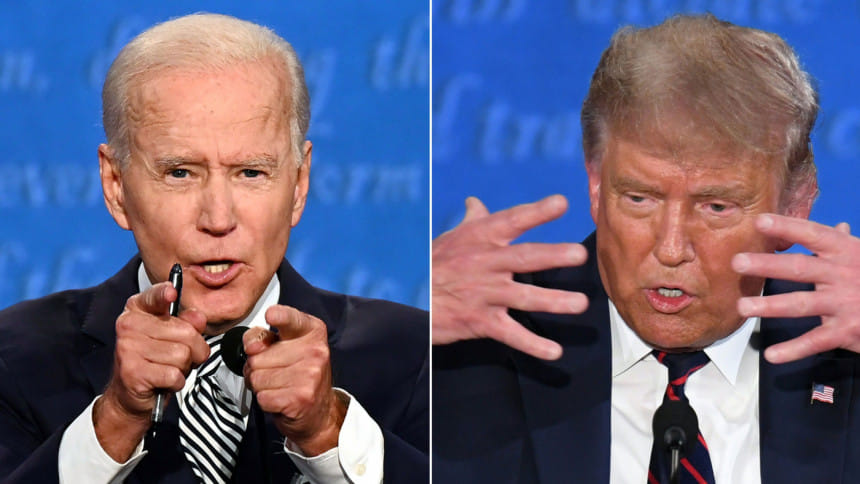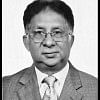A slugfest in the name of a political debate

It is, in the end, for the American people to decide who should occupy the coveted Oval Office on 1600 Pennsylvania Avenue in the nation's capital for the next four years. Although what one witnessed in the Covid-19-enforced empty hall in Cleveland on Tuesday would only reinforce the growing public cynicism in the country's body politic in particular, and democracy in general. Much of that finds manifestation in Polish author Monika Wisniewska's satirical comment, "The vaccine (for Covid-19) should be tested on politicians first. If they survive, the vaccine is safe. If they don't, then the country is safe."
How much the slugfest in the name of a political debate will move the electoral needle is difficult to predict at this stage. With more than a million Americans already casting early ballots through the post—an established practice that the current incumbent is explicitly uncomfortable with—and with time running out to change minds or influence the small sliver of undecided voters, the stakes were undoubtedly enormous as the two contenders for the most powerful office in the world took the stage, just five weeks before the November 3 Election Day.
One would recall with sighed fondness how a presidential debate impacted on the outcome in then Senator John Kennedy's favour against an experienced, wily and hardened politician like Richard Nixon in 1960. It set a new political threshold that, although had not been met since, would persuade American voters to wait with baited breath to see how contenders for the highest office in the land of the brave and the home of the free would turn up on stage and float ideas that would impact on their daily lives. To the outside world, the interest lay in hearing how the next leader of the free world would help shape the global stage.
But the immediate and visible reaction following the September 29, 2020 "debate" among the informed groups in America has been sharply negative. They did not like what they saw and heard on Tuesday night. Many even screamed, "Cancel more debates!" This virtually reflected a tectonic shift in the ordinary voter's mind, one tinged with deep cynicism.
The United States of America has its share of dark history. Institutionalised slavery and racism, military actions like the atomic bombing of Hiroshima and Nagasaki in Japan, or the firebombing of Dresden in Germany, towards the end of the World War II, all causing heavy civilian deaths, unjustifiable wars like the one in Vietnam and elsewhere, are all part of that. Notwithstanding that, it has been by far the most favoured destination for more than a century for people from all across the globe seeking a better life. It offered challenges and opportunities in abundance. One only needed the skills and the will to use them for achieving one's desired goal through an accountable and fair system. The society in general guaranteed freedom of thought and action that perhaps would be the envy of many. Over time, it graduated from being a melting pot to a healthy mosaic of diverse races, cultures, faiths and beliefs that gave it an inner strength. It may not have been the perfect society, but then, no society is. It still had the magnetic pull that drew so many to it.
President Ronald Reagan, whose ideological beliefs many did not share, in his final speech as president most eloquently articulated what gave America its strength. Narrating the experience of a German prisoner of war in America before he had to return to the Eastern part of his now-divided country, Reagan brought forth the contours that America, a country of immigrants, of mixed colours and races, offered to itself and to the world. It was one of tolerance, inclusiveness, accountability, transparency, and honesty.
One sincerely hopes that the prevailing state of play is a blip on the long journey of a nation to sustained progress and prosperity in a democratic and peaceful environment, one that has characterised the American society for long.
I am not making any prediction on the outcome of the elections on November 3. I did that with a measure of confidence in 2016, only for the Electoral College, not the popular vote, to prove me wrong.
All those who wish well for the United States of America will hope that after November 3 this year, inclusiveness will return, the division between the aisles will narrow, diversity will be embraced, isolationist trends will be reversed, its heroes will be honoured and Americans of every hue will find solace in making the right choice. The outside world needs to be able to look at the United States as a reliable and dependable partner, more so at a time when narrow, myopic and bellicose nationalist elements are threatening to tear us all apart.
Shamsher M. Chowdhury, BB is a former foreign secretary of Bangladesh and former ambassador to the United States.

 For all latest news, follow The Daily Star's Google News channel.
For all latest news, follow The Daily Star's Google News channel. 



Comments